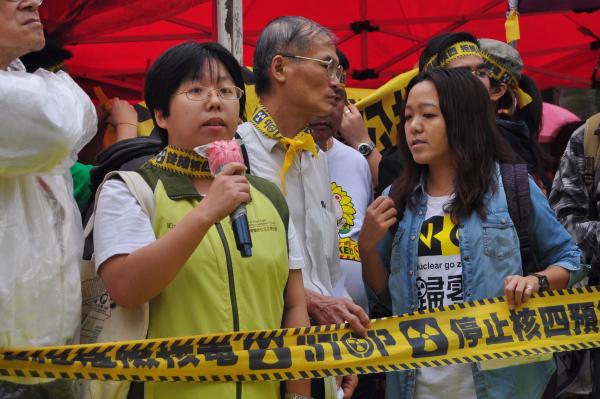A decision needed on Longmen power plant
Tsai Ya-ying(lawyer affiliated with the Wild at Heart Legal Defense Association.) / Translated by Julian Clegg
2017/12/06
A decision needed on Longmen power plant
By Tsai Ya-ying 蔡雅瀅

In April 2014, the Cabinet announced that the Fourth Nuclear Power Plant — the Longmen plant in New Taipei City’s Gongliao District (貢寮) — would be mothballed and its No. 1 reactor sealed.
The Cabinet allocated a budget of NT$1.279 billion (US$42.3 million) to cover the costs of maintaining the idle plant and its site for the first year and provisionally allocated a three-year budget.
In July last year, Taiwan Power Co (Taipower) drew up a budget of NT$1.36 billion for maintaining the plant, but the legislature voted unanimously to reduce that amount by NT$500 million and resolved that Taipower should not allocate any more funds to the site.
However, in Taipower’s proposed budget for next fiscal year, it has disregarded the legislature’s resolution by allocating NT$817 million for the maintenance and management of the plant’s assets on the grounds it might still be converted or sold.
Article 95 of the Electricity Act (電業法) states that “the nuclear energy-based power-generating facilities shall wholly stop running by 2025.”
That deadline is only seven years away, but according to Taipower’s plan for decommissioning the nation’s oldest nuclear plant — the Jinshan Nuclear Power Plant in New Taipei City’s Shihmen District (石門) — it will take about 25 years to decommission it and return the site to its original condition.
However, the Longmen plant has never had nuclear fuel installed in it and has therefore not been contaminated by radiation, making it relatively easy to convert. There is no point in commissioning it for a mere seven years’ electricity supply and then spending at least a quarter of a century for decontamination and decommissioning.
Besides, before the Longmen plant was mothballed, it had numerous incidents like fires, waterlogged equipment, bad workmanship and illegal alterations to its design, and even after it was mothballed, there was an incident involving overflowing pipes.
Considering all the malfunctions, the price to be paid if the plant is commissioned might not be just an economic problem, but a matter of health and safety; it could even constitute an existential threat to the nation.
Furthermore, 597 pieces of equipment from the plant’s No. 2 reactor have been permanently transferred to reactor No. 1, which was short of spare parts, and its fuel storage racks have been transferred to the Guosheng Nuclear Power Plant in New Taipei City’s Wanli District (萬里) to refurbish that plant’s spent fuel pool.
Given that the Longshan plant no longer has all the equipment it needs, it is doubtful whether it could be commissioned at all.
Since there is no prospect of commissioning the Longshan plant, Taipower is calling for it to be converted or sold.
A final decision on its fate should be made sooner rather than later. If buyers can be found for the equipment, it should be dismantled and sold as soon as possible to avoid spending hundreds of thousands of New Taiwan dollars year after year to manage and maintain the plant, while it keeps depreciating and gets harder to sell.
Taipower is looking into the possibility of turning the plant into another kind of power plant. Alternatively, it could be made it into an electricity museum or amusement park, as civic groups suggest, or an alternative site for building the nation’s third liquid natural gas terminal.
Whatever the decision, something has to be done about it, and it is better to move forward than to keep squandering public funds and wasting the lives of staff and workers to keep it mothballed for nothing.
Tsai Ya-ying is a lawyer affiliated with the Wild at Heart Legal Defense Association.
Translated by Julian Clegg
Tsai Ya-ying(lawyer affiliated with the Wild at Heart Legal Defense Association.) / Translated by Julian Clegg
Keywords
#Energy and Resource